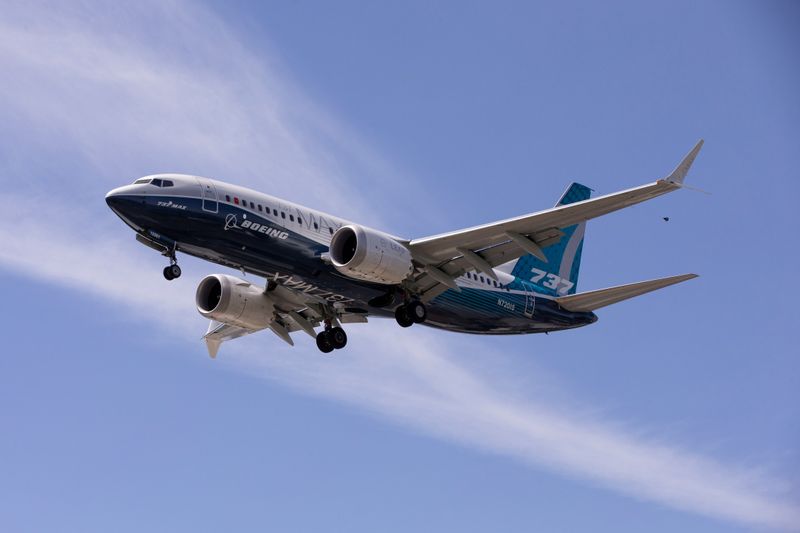By David Shepardson, Eric M. Johnson and Tracy Rucinski
WASHINGTON/SEATTLE/CHICAGO (Reuters) - Boeing Co (N:BA) failed to submit certification documents to the U.S. Federal Aviation Administration (FAA) detailing changes to a key flight control system faulted in two fatal crashes, a long-awaited government report seen by Reuters has found.
The flight control system, known as MCAS, was "not an area of emphasis" because Boeing presented it to the FAA as a modification of the jet's existing speed trim system, with limited range and use, according to the report.
The 52-page report by the U.S. Department of Transportation's Office of Inspector General (IG), dated June 29 and set to be made public Wednesday, laid bare mistakes made by both the planemaker and FAA in the development and certification of Boeing's top-selling aircraft.
The FAA declined to comment beyond the department's response attached to the report. The IG did not immediately respond to a request for comment. A Boeing spokesman said the company had taken steps to enhance safety and was committed to transparency. "When the MAX returns to service, it will be one of the most thoroughly scrutinized aircraft in history, and we have full confidence in its safety," he said.
The IG's report is the latest of reports faulting the plane's approval, while the Justice Department has an ongoing criminal investigation.
The 737 MAX has been grounded from commercial flight worldwide since March 2019 after two crashes killed 346 people in Ethiopia and Indonesia over a five-month span.
Boeing's so-called MCAS stall-prevention system has been faulted in both crashes, when the system repeatedly and forcefully pushed down the jet's nose as pilots struggled to intervene, among a cocktail of factors pinpointed by crash investigators.
The inspector general report details activities from the early phase of the certification process in January 2012 through the second crash. It also details allegations of "undue pressure" from Boeing management on workers handling safety certification, though it adds that all "formally reported" instances of undue pressure were "satisfactorily addressed."
The IG's office will issue recommendations to the FAA later this year, the Transportation Department said in comments about the draft report submitted on June 8.
The FAA is currently evaluating the MCAS upgrades during a series of certification test flights this week that could pave the way for the jet's return domestically by year end.
REGULATORS IN THE DARK
In response to the report, the Transportation Department said the FAA's certification of the 737 MAX was "hampered by a lack of effective communication" between the agency and U.S. planemaker.
Crucially, that included the "incomplete understanding of the scope and potential safety impacts" of changes Boeing made to the jet's flight control system to give it more power and authority, the agency said.
"Boeing did not submit certification documents to FAA detailing the change," the report said. "FAA flight test personnel were aware of this change, but key FAA certification engineers and personnel responsible for approving the level of airline pilot training told us they were unaware of the revision to MCAS."
The FAA conducted its first-ever detailed review of the system in January 2019, three months after the first crash in Indonesia. The review resulted in documentation that was never finalized, the report said.
The report also noted that, after the Indonesia crash, the FAA completed a risk analysis that found that the uncorrected risk to the 737 MAX was 2.68 fatalities per 1 million flight hours, which exceeded the FAA's risk guidelines of 1 fatality per 10 million flight hours.
A December 2018 FAA analysis determined a risk of about 15 accidents occurring over the life of the entire 737 MAX fleet if the software fix was not implemented.
After the crashes, Boeing proposed and FAA accepted a redesign of MCAS software that would include additional safeguards against unintended MCAS activation.
Boeing also created a Product and Services Safety Organization for employees to raise concerns over safety and undue pressure, first reported by Reuters.

Boeing agreed to develop the MCAS software update by April 12 and operators would have until June 18, 2019, to install the software. As Boeing worked on proposed software upgrade for MCAS, a second plane crashed in March 2019 in Ethiopia.
